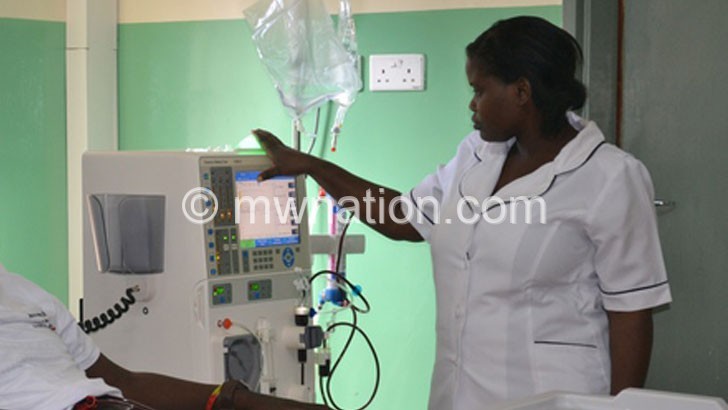Calls mount for government to act on dialysis crisis
Malawi Health Equity Network (Mhen) and the Parliamentary Committee on Health have urged government to quickly raise K61.7 million ($82 267) to fix the dialysis machine at Queen Elizabeth Central Hospital (QECH) in Blantyre.
The two bodies said the country cannot afford to subject people with kidney conditions to travel to Lilongwe for treatment.

About 15 people have so far been relocated to Lilongwe to access dialysis services following the breakdown of the machine in Blantyre and government’s failure to raise K61.7 million to pay the company that services the machines.
Mhen executive director George Jobe said it is wrong to allow the kidney patients in Lilongwe to face such kind of challenges until the passing of the next national budget.
Jobe also appealed to the private sector to raise K100 million ($133 333) to fix the dialysis machine at QECH to help people that are in Lilongwe if government cannot act quickly.
“If one may not have resources to sustain himself or herself in Lilongwe [at KCH] it would be a catastrophe to their lives. We plead with companies and other well-wishers to assist in this noble exercise.
“Companies in the private sector can raise K100 million to fix the machines at QECH and even go a step farther to procure one or two new ones. It is high time as a nation we had dialysis machines in all central hospitals and even district hospitals,” he said.
Mhen said while they acknowledge that Malawi is sailing through tough economic challenges it cannot be an excuse when it comes to health matters.
On her part, chairperson of the Parliamentary Committee on Health, Juliana Lunguzi, said transferring patients to Lilongwe for dialysis was not a solution because it is not a one-off treatment and wondered how long government can sustain such movements of patients.
“All in all this is a big inconvenience to both patients and families. As government these are some of the social services they should be willing to pay for their taxpayers,” she said.
Lunguzi said her committee is concerned with the level of dysfunction in the country’s public health facilities.
“We hear of quite a few equipments that are dysfunctional in our health facilities from health centres to central hospitals. This is unfortunate because one of the critical components in patient care is the ability to acutely diagnose,” she said.
Lunguzi said failure to properly manage people’s conditions result in disability and untimely death, adding that what was disheartening was the country’s inability to repair equipment in the health facility.
“Management unit within Ministry of Health has a separate directorate. One wonders whether they just focus on procurement as opposed to the whole range of services, including repairs,” she said.





